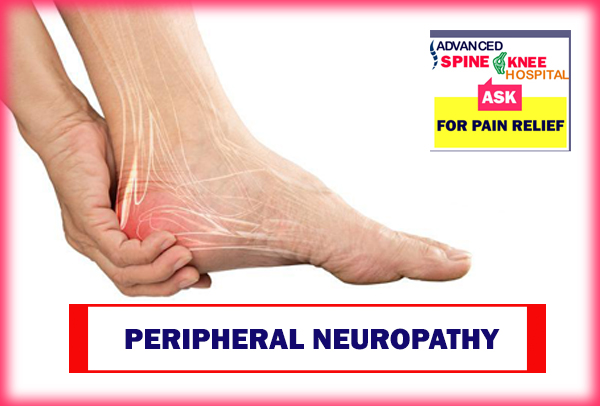Neuropathy is dysfunction of one or more nerves that typically results in numbness, tingling, muscle weakness and pain in the area affected. Usually it starts in your hands and feet, but other parts of your body can also be affected.
Neuropathy is very common, which affects people of all ages, but older people are at increased risk. Other than age, some of the more common risk factors for neuropathy include diabetes, metabolic syndrome (high blood pressure, high cholesterol, obesity, diabetes), and heavy alcohol use. People in certain professions, with repetitive motions, have greater chance of developing mononeuropathies from trauma or compression of nerves.
Among other commonly cited statistics, neuropathy is present in:
• 60% to 70% of people with diabetes.
• 30% to 40% of people who receive chemotherapy to treat cancer.
• 30% of people who have human immunodeficiency virus (HIV).
Peripheral neuropathy can affect one nerve (mononeuropathy), two or more nerves in different areas (multiple mononeuropathy) or many nerves (polyneuropathy). Carpal tunnel syndrome is an example of mononeuropathy. Most people with peripheral neuropathy have polyneuropathy.
What is peripheral nervous system?
It is the network of nerves that lie outside the central nervous system (the brain and spinal cord).
It includes different types of nerves with their own specific functions, including:
• sensory nerves – responsible for transmitting sensations
• motor nerves – responsible for controlling muscles
• autonomic nerves – responsible for regulating automatic functions of the body, like blood pressure and bladder function
Different types of peripheral neuropathy:
Peripheral neuropathy may affect:
• only 1 nerve (mononeuropathy)
• several nerves (mononeuritis multiplex)
• all the nerves in the body (polyneuropathy)
• Polyneuropathy starts by affecting the longest nerves first, so symptoms typically begin in the feet.
Signs and symptoms of peripheral neuropathy might include:
• Numbness, prickling or tingling gradually in your feet or hands, which spread upward into your legs and arms
• Sharp, jabbing, throbbing or burning pain
• Extreme sensitivity to touch
• Pain during activities which are not at all pain causing, such as pain in your feet when putting weight on them or when they’re under a blanket
• Lack of coordination and falling
• Muscle weakness
• Sensation of wearing gloves or socks when you’re not
• Paralysis if motor nerves are affected
Signs and symptoms when autonomic nerves are affected, might include:
• Heat intolerance
• Excessive sweating or not being able to sweat
• Bowel, bladder or digestive problems
• Changes in blood pressure, causing dizziness or lightheadedness
Causes:
Health conditions that can cause peripheral neuropathy include:
• Autoimmune diseases – These include Sjogren’s syndrome, lupus, rheumatoid arthritis, Guillain-Barre syndrome, chronic inflammatory demyelinating polyneuropathy and vasculitis.
• Diabetes
• Infections – These include certain viral or bacterial infections, including Lyme disease, shingles, Epstein-Barr virus, hepatitis B and C, leprosy, diphtheria, and HIV.
• Tumors
• Bone marrow disorders
• Alcoholism. Poor dietary choices made by people with alcoholism can lead to vitamin deficiencies.
• Exposure to poisons. Toxic substances include industrial chemicals and heavy metals such as lead and mercury.
• Medications
• Trauma or pressure on the nerve
• Carpal Tunnel Syndrome
• Kidney Failure
• Vitamin + Nutrition Deficiency
• Chemo-induced PN
• Diabetes
• Idiopathic Neuropathy
• Heredity Disorders
• Other
Prevention:
Manage underlying conditions and make healthy lifestyle choices
These habits support your nerve health:
• Eat a diet with more fruits, vegetables, whole grains and lean protein to keep nerves healthy. Protect against vitamin B-12 deficiency by eating meats, fish, eggs, low-fat dairy foods and fortified cereals. If you’re vegetarian or vegan, fortified cereals are a good source of vitamin B-12, but talk to your doctor about B-12 supplements.
• Exercise regularly. With your doctor’s OK, try to get at least 30 minutes to one hour of exercise at least three times a week.
• Avoid actions that may cause nerve damage, like repetitive motions, cramped positions that put pressure on nerves, exposure to toxic chemicals, smoking and overindulging in alcohol.
Complications of peripheral neuropathy:
The outlook of the condition varies depending on the underlying cause and the nerves damaged. If the underlying cause is treated, some cases may improve with time, whereas in some people the damage may be permanent or may get gradually worse with time.
You may be at risk of developing potentially serious complications, such as a foot ulcer, if the underlying cause is not treated. In severe cases may mean the foot has to be amputated.
Peripheral neuropathy can affect the nerves controlling the automatic functions of the heart and circulation system (cardiovascular autonomic neuropathy).
Visit Advanced Spine and Knee Hospital today and take help of our pain management Specialist. New state of the treatments like CET(Combined Electrochemical Treatment) are available at ASK, using local nerve blocks significantly reduces neuropathic pain.
- Working Hours: Mon - Sat : 9:00 am to 7:00 pm

